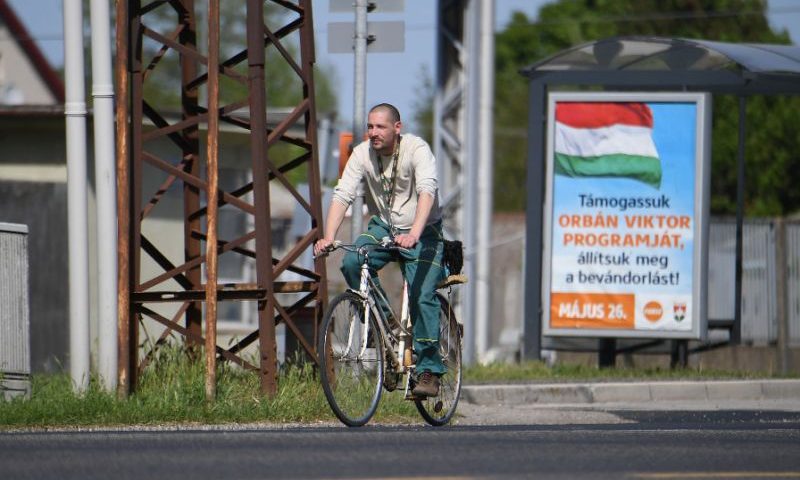Never mind the EU-funded roads and hospital. In the sleepy Hungarian town of Csorna, there is only one European Parliament election poster on billboards and bus-shelters: “Back Viktor Orban’s programme, stop immigration!”
Csorna is staunch pro-Orban territory, 150 kilometres (93 miles) west of Budapest on the flatlands near the Austrian border.
At the last two general elections, Orban’s ruling Fidesz party gained its biggest wins nationally in the town of 10,000, where many locals are proud of their combative prime minister.
“Orban stopped the migrants, thank God, and stands up for Hungary against Brussels,” Istvan Balassa, 49, said from the hatch of a fast-food van parked outside the town hall.
“Europe has been too liberal with the migrants, it doesn’t need any more Muslims,” he said while doling out “langos”, a popular Hungarian snack made of fried dough.
– ‘Stop Brussels’ –
Orban has framed May’s vote as a fight for “Christian civilisation” and warns that “Brussels bureaucrats” want to “replace” Europe’s population with immigrants.
His seven-point programme calls for Brussels to stop issuing refugees with what Hungary calls “migrant visas”, despite the European Commission insisting it has “zero plans” to introduce such permits.
Budapest also rejects pre-paid “migrant bank cards” that it says could be used by terrorists to travel and stay in Europe.
Locals attributed the apparent lack of migrants in Csorna to Orban’s tough measures, including a border fence installed in 2015.
“The (southern) border is well defended and keeps them out,” kindergarten worker Borbely Ferencne told AFP.
“Why should my taxes go to migrant visas or bank cards? Brussels is not handling the migration issue well,” the 56-year-old said.
Orban’s programme is just the latest in a series of anti-EU and anti-immigration campaigns waged by Budapest.
In 2017, it urged Hungarians to “Stop Brussels” over its alleged interference in national sovereignty.
A nationwide billboard campaign this year targeted European Commission President Jean-Claude Juncker and Hungarian-born US billionaire George Soros for allegedly encouraging illegal immigration.
The posters — which the Atlatszo.hu investigative website says cost more than 30 million euros ($33.5 million) of taxpayer money — led to Fidesz being suspended from the European People’s Party (EPP), its own centre-right political grouping in the European Parliament.
Csorna’s former socialist mayor Jozsef Papp said he detected a growing ambivalence about the EU since Orban and Fidesz swept to power in 2010.
“The campaigns scare people,” the 59-year-old told AFP in the town’s leafy Saint Stephen’s Square.
“They also deflect attention from people’s real problems, like young people leaving for higher wages in Austria.”
Meanwhile, opposition parties’ election campaigns are noticeably absent in Csorna.
The cash-strapped parties complain that businesses owning advertising platforms only accept Fidesz posters, or charge them inflated prices, making it difficult to get their pro-EU messages out.
Last month, opposition politicians also protested outside the public broadcaster’s headquarters in Budapest to demand they receive more airtime on news programmes.
“Around 70-80 percent of Hungarians only hear the messages produced by the government propaganda organs,” protester Akos Hadhazy told AFP.
– ‘EU money is squandered’ –
Still, support among Hungarians for EU membership remains high, according to a recent Eurobarometer survey.
More than 80 percent of participants said they would vote in favour of staying in the bloc in a referendum, mainly for practical benefits like freedom of movement and financial aid.
Trucks en route to Austria no longer clog up Csorna town centre thanks to a new ring road, partly built with EU structural funding.
A wing of the local hospital and the town’s drainage system have also been revamped.
“Hungary opened its markets to EU firms who take out huge profits, so deserves any money it gets in return,” a cyclist on a new EU-funded lane said before speeding off without giving his name.
But some locals voiced suspicions about rampant corruption.
“The EU money is squandered on unnecessary overpriced investments, given to circles of friends, without any competition,” bus driver Gyorgy Szabad, 54, told AFP.





